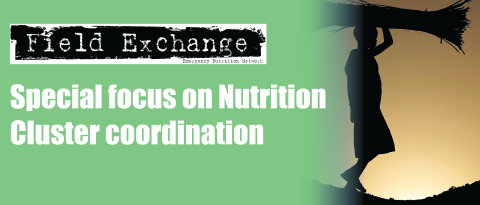Global Nutrition Cluster Strategy 2017-2020
The 2017-2020 Global Nutrition Cluster (GNC) Strategy was developed by the GNC-Coordination Team and the GNC Strategic Advisory Group with support from consulting firm Avenir Analytics. The process involved an extensive review and consultation with a wide range of stakeholders using an online survey, key informant interviews and a focus group discussion, undertaken during the last quarter of 2016. The new GNC strategy also drew on lessons learnt from the previous strategy, changes in the humanitarian operating and policy environment, and GNC stakeholder expectations. The draft strategy was extensively reviewed and endorsed by GNC partners. Based on this analysis and review, the core of the GNC Strategy for 2017-2020 is focused on the following three areas:
1. Supporting operational delivery of national emergency nutrition coordination platforms. This is focused on supporting national platforms to deliver the core cluster functions to ensure a more timely, effective and people-centred response. Based on the ‘emergency continuum,’ this involves supporting national platforms to:
a. Prepare for crises and be well positioned to meet their responsibilities during the response phase of an emergency.
b. Respond to crises when they arise, primarily by delivering the core cluster functions.
c. Lead the timely transition to national coordination mechanisms (where not already leading) to maximise efficiency, effectiveness and local ownership of responses.
2. Strengthening capacity through national/regional and global platforms to support national coordination platforms to deliver more effective and people-centred responses. The GNC intends to develop the capacity of nutrition practitioners globally and locally on nutrition in emergency response coordination. These outcomes are highly correlated with objective one as supporting national platforms helps build coordination capacity in practice.
3. Advocating and influencing for more effective coordination. The GNC will provide leadership (along with the cluster lead agency and cluster partners) in advocating for greater nutrition coordination in crises and for inter-cluster and multi-sector approaches to meet the needs of affected populations.
Other areas highlighted in the strategy include:
Scope of activities which fully clarify the GNC’s role in terms of its mandate and technical responsibilities, with an attempt to delineate the areas that are within the GNC’s scope of activities and those that are not.
Ways of working which briefly outline the roles and responsibilities of GNC constituents and other key stakeholders who would help deliver the strategy and related work plan.
Outcomes, indicators and baseline targets have been linked to the strategic priorities and supporting objectives to help with delivery.
The GNC strategy, and specifically the strategic priorities, have guided the development of a rolling work plan and prioritisation of activities to be implemented in the first two years (2017-2018).
A mid-term review will be undertaken at the end of 2018 to determine progress made against strategic priorities and inform any adjustments required.
The strategy is available at: http://nutritioncluster.net/download/6805/


